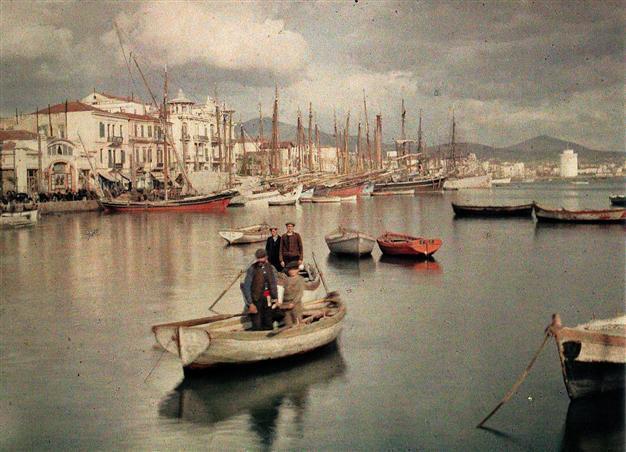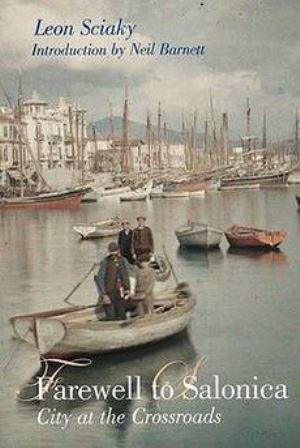‘Farewell to Salonica’
William ARMSTRONG - william.armstrong@hdn.com.tr

Salonica, 1913. Albert Kahn Collection
‘Farewell to Salonica: City at the Crossroads’ by Leon Sciaky (Haus Books, $25, 262 pages)If I could travel back in time to any city at any historical moment, Salonica at the turn of the 19th and 20th centuries would be near the top of the list. Distant from the surveillance and authority of Istanbul, perched on the edge of Europe, Salonica was an archetypal Ottoman metropolis, a cosmopolitan mélange tugged in conflicting directions by the forces of history. The city - majority Jewish for many years after the wave of migration from Spain in the 15th century - had become a crucible for dangerous and revolutionary new ideas and movements by the end of the 1800s, a whirlpool of conflicting forces tugging at the status quo. Various nationalist groups were seeking to break away from the empire, while others were seeking to reform it; European influence was steadily increasing in industry, commerce, fashion, and new technology, while the general population largely continued with its ossified traditions.
Plenty has been written about Salonica, but Leon Sciaky’s vivid memoir of a childhood growing up in a prosperous Jewish family in the city is not very well known. Much of “Farewell to Salonica” belongs firmly in the genre of rose-tinted inter-communal Ottoman nostalgia, but its early soft-focus sepia hue only serves to frame the grimmer reality that comes later, as a prelapsarian idyll collapses into deadly rubble.
 Sciaky’s genial father was an archetypal late Ottoman Jewish merchant. Involved in the grain trade, he did business with everyone and had warm relations with all local communities, making regular business trips into the Macedonian hinterland to visit factories on the new “Frankish” railway. The family was comfortable inviting Greek and Muslim friends into its house, and measured its days by the calls to prayer of the local muezzin. In Sciaky’s telling, Salonica emerges as the classic Ottoman urban space where boundaries were simultaneously tight and permeable, and where a prejudiced but inconsequential slur was always on the tip of everyone’s tongue. Salonica largely “slumbered in blissful ignorance of the passions of which now and then it heard faint rumbles.”
Sciaky’s genial father was an archetypal late Ottoman Jewish merchant. Involved in the grain trade, he did business with everyone and had warm relations with all local communities, making regular business trips into the Macedonian hinterland to visit factories on the new “Frankish” railway. The family was comfortable inviting Greek and Muslim friends into its house, and measured its days by the calls to prayer of the local muezzin. In Sciaky’s telling, Salonica emerges as the classic Ottoman urban space where boundaries were simultaneously tight and permeable, and where a prejudiced but inconsequential slur was always on the tip of everyone’s tongue. Salonica largely “slumbered in blissful ignorance of the passions of which now and then it heard faint rumbles.”But clouds were gathering. All communities chafed under the authoritarian rule of Abdülhamid II, and the Bulgarians in particular were getting restless, with the Macedonian Revolutionary Organization (IMRO) spilling blood in its bid to violently overthrow Ottoman rule in the region. The Committee of Union and Progress (Young Turks) was also established by military officers in the city in 1889, seeking to reintroduce constitutional rule to the empire. When Abdülhamid was finally toppled in 1908, Sciaky writes that the event was welcomed with “delirious joy … unparalleled by any other show of feeling in the history of the country”:
Greeks, Bulgarians, Turks, Jews, Armenians and Albanians had literally fallen into each other’s arms and with tears of joy had embraced and called each other ‘Brother.’ The streets and squares had echoed with the jubilant hymns of joy which had risen from thousands of hearts … It was to be the end of discrimination and injustice. It was to be the end of internecine struggles and bloodshed, the end of hatreds … It was time to work hand in hand for the good of all.
However, this “dreamlike happiness” was fragile. Within a few years, the Balkan Wars had forced most Turks out of Europe, and the Young Turk revolution had taken on a harder Turkish nationalist edge, (conveniently enough, Sciaky tells us that his Turkish schoolteacher began to extol the works of Ziya Gökalp at around the same time). Salonica was taken by Greece in 1913, and the call to prayer that Sciaky had previously measured his days by fell silent as the Turks were driven out of the city. The brutal onslaught of the outside world on the family's previously serene life soon led them to emigrate to the U.S. in 1915, where this memoir was written a couple of decades later.
The tone is strangely ornate throughout, (the final chapter is titled, “The Old Order Passeth”), but though it may not be full of zinging one-liners, it does become tougher, mirroring the history it describes. After the violence that he saw rip apart the idyllic Salonica of his childhood, a melancholy Sciaky is left to reflect on what Joseph Conrad described as civilization’s “rags that fly off at the first good shake”:
Civilisation was but a thin crust, a layer so tenuous that one dared not trust. And under this layer lay primitive man, still prostrate before his golden calves, still stumbling under the weight of his self-wrought chains. He stammered the new language of science while he clung timorously to his ancient fetishes and shibboleths.










